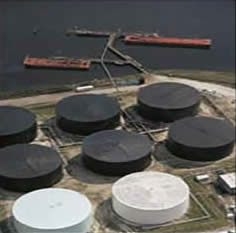Home → Waste Management → Programs → Aboveground Oil Storage Tanks → AST Regulatory Information → Marine Oil Terminals
Marine Oil Terminals
Marine oil terminals are large facilities engaged in the transferring, processing or refining, and storing of oils. As the name implies, marine oil terminals conduct the transfer of oil to or from the terminal by means of navigable waters. Please see the regulatory decision tree below.

- ME SFMO
State Fire Marshall's Permit required for tank installation - Federal EPA
SPCC Plan Federal Law 40 CFR Part 112 if storage capacity >1,320 gallons - ME DEP
SPCC Plan Maine Law 38 MRS § 570-K(5) if storage capacity >1,320 gallons - ME DEP
Maine DEP Chapter 600 Rules for Marine Terminals - MEMA
Annual Inventory Reporting and Registration fee for 10,000 lbs or more of hazardous substances including petroleum
- ME SFMO
Any oil storage tank larger than 60 gallons and not connected directly to an oil burning appliance must be permitted by the State Fire Marshal's Office. For more information regarding the permitting procedure, please contact the Maine State Fire Marshal's Office at (207) 626-3890. (Off Site)
If the oil storage is larger than 1,320 gallons or the facility owner has multiple tanks exceeding 1,320 gallons at their facility, then they are required to implement a Spill Prevention, Control, and Countermeasure (SPCC) Plan in accordance with state and federal laws.
Chapter 600 sets forth the minimum design and operating requirements for marine oil terminals and intrastate pipelines. Separate sections are included for siting requirements, design and construction requirements for new and existing marine oil terminal facilities, staff training and safety, and closure of tanks and facilities.
The Maine Emergency Management Agency (MEMA) requires annual inventory reporting, in accordance with federal Emergency Planning and Community Right-to-Know Act (EPCRA) laws. They also collect an inventory and registration fee annually. The inventory and registration fee applies to both ASTs and USTs that store 10,000 lbs or more of a hazardous substance (includes petroleum products and equates to approximately 1,570 gallons), with the exception of USTs at retail service stations. (The exception granted to retail service station USTs does not extend to ASTs because of the inherent dangers ASTs pose to first responders at a given site.) The federal reporting requirement has been in place since 1986, and the State requirement for reports and fees has been in place since 1989.
For information on inventory reporting and emergency response planning requirements for facilities storing oil and/or hazardous materials contact the Maine Emergency Management Agency: Faith Staples, Technological Hazards Specialist, 72 State House Station, Augusta, ME 04333-0072; telephone: (207) 624-4400.
Report oil spills immediately!
Call 1-800-482-0777 from within Maine 24 hours a day.
Additional Emergency & Spill Response Reporting Telephone Numbers.
Natural Hazard Risk Assessment
The Maine Department of Environmental Protection completed guidance to assist marine oil terminal owners and operators in planning for climate change. This planning tool is a Natural Hazard Risk Assessment (NHRA). A NHRA developed under the requirements of the DEP’s Chapter 600 must evaluate the risks from natural hazards (flooding, sea level rise, and storm damage) to terminal infrastructure and other assets. The guidance utilizes the best available scientific evidence and local knowledge to assess risks associated with a 100-year flood event and a 100-year flood given Intermediate and High Sea Level Rise (SLR) scenarios. A NHRA must also identify how terminals will manage a 24-hour, 100-year precipitation event in their facility drainage system.